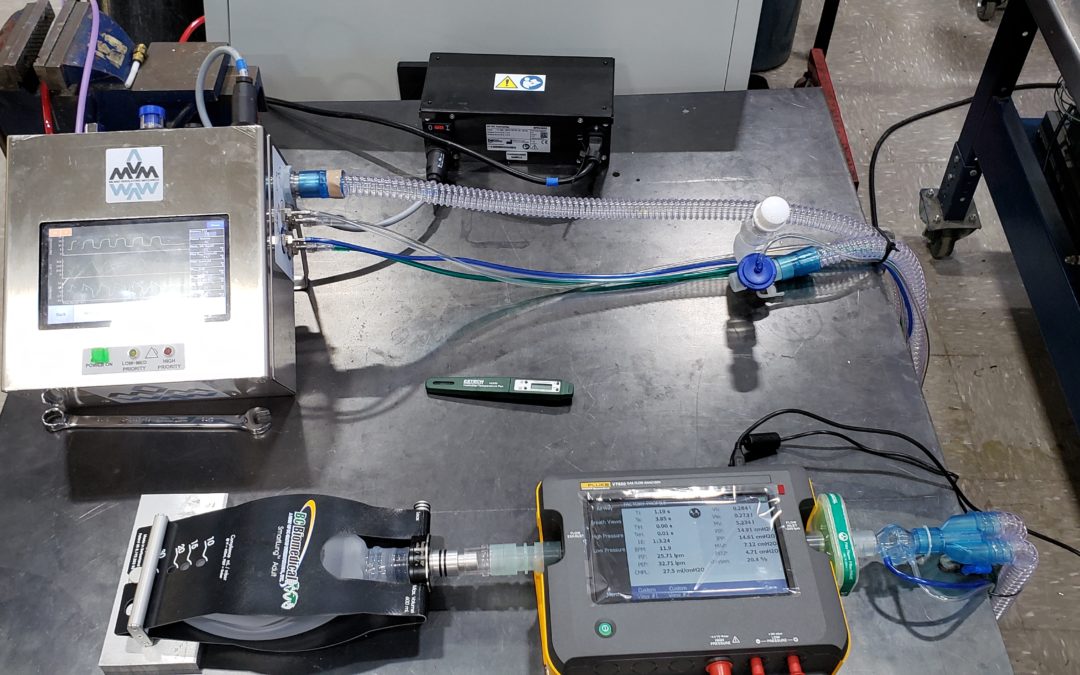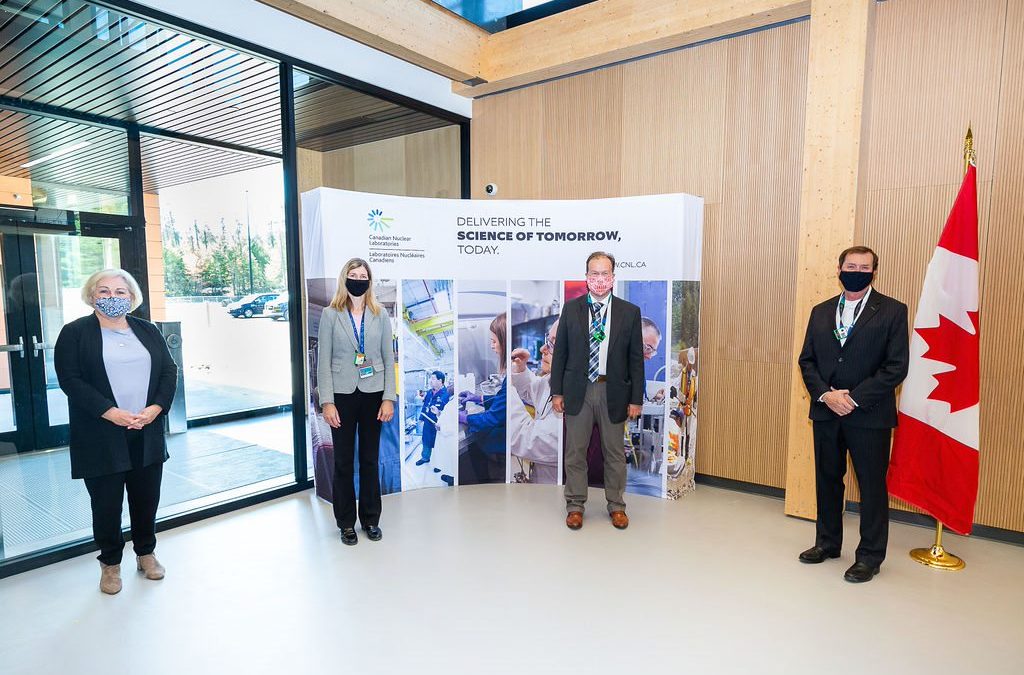Dec 23, 2020
The Government of Canada has appointed Fred Dermarkar to take over as President and Chief Executive Officer (CEO) of Atomic Energy of Canada Limited (AECL) effective February 7, 2021.
Fred will replace Richard Sexton, who will retire after 38 years in the industry when his mandate ends in February. Richard has served as AECL’s President and CEO since February 2018, and was interim President and CEO and Acting Chief Transition Officer of AECL for almost two years prior to that.
“I would like to thank Richard for his service to AECL over the past five years. He has played an integral role in establishing AECL as a strong oversight organization and in advancing AECL’s nuclear science and environmental remediation mandates”, said James Burpee, Chair of the Board of AECL.
“It has been an honour to be part of the renewal of nuclear research and development in Canada at a time when nuclear energy is recognized as an important part of Canada’s low-carbon energy goals”, said Richard Sexton.
Fred Dermarkar will join AECL following close to seven years as the President and CEO of the CANDU Owners Group (COG). Prior to that, he held a variety of technical and executive positions at Ontario Power Generation (OPG), and has 40 years experience in the Canadian nuclear sector. “As countries around the world consider the importance of nuclear energy as part of a clean energy mix, AECL has an important role to play in seeing that Canada remains at the forefront of nuclear innovation. I am excited to contribute to AECL’s success in that area and to advance AECL’s environmental remediation mandate”, said Fred Dermarkar.
As a federal Crown corporation, AECL’s mandate is to enable nuclear science and technology and to protect the environment by fulfilling the Government of Canada’s radioactive waste and decommissioning responsibilities.

Sep 30, 2020
Today, Vexos Inc., an electronics manufacturing and custom materials solutions company, received authorization from Health Canada for the Mechanical Ventilator Milano (MVM) ventilator.
The MVM ventilator was born out of the collaboration of a national and international team who came together to develop a ventilator model which is easy-to-produce, using off-the-shelf, easily accessible parts. Canadian Nuclear Laboratories (CNL), which operates our sites, was part of the MVM consortium and mobilized its scientists and engineers to apply their expertise in support of this important initiative.
As we continue to face challenges related to the COVID-19 pandemic, this is another example of how the global community is coming together to solve complex problems.
At AECL, we are proud to support Canada’s response to the pandemic. Our sites are home to some of Canada’s most unique and innovative facilities, laboratories, equipment and, most importantly, expertise. CNL mobilized its scientists, engineers, technical staff and facilities to contribute to the national response to COVID-19. This is a clear example of the value of these scientific capabilities and assets.
Today’s announcement paves the way for Vexos to manufacture and supply 10,000 ventilators as part of a national, made-in-Canada, effort to treat patients most severely affected by the COVID-19 virus. Vexos will now start shipping the MVM ventilators to the Government of Canada.
The MVM consortium was initiated in Italy and grew to include physicists, engineers, and business leaders from around the world, including here in Canada: Canadian Nuclear Laboratories, TRIUMF, SNOLAB, McDonald Institute, Vexos and JMP Solutions.
Regulatory authorization of the ventilator is the culmination of the ingenuity and tireless efforts of the entire MVM consortium.
I am incredibly proud of how employees at AECL and CNL, together with our partners across the country, are collaborating during this difficult and challenging time.
Richard J. Sexton
President and CEO of AECL
For more information on Vexos: https://www.vexos.com/vexos-receives-approval
For more information on the MVM consortium: http://mvm.care/who-we-are-en/

Sep 21, 2020
Paul Lefebvre, Parliamentary Secretary to the Minister of Natural Resources today participated in a ceremony to inaugurate one of the new facilities at the Chalk River Laboratories. Managed by Canadian Nuclear Laboratories (CNL) on behalf of AECL, the Chalk River campus is Canada’s national nuclear laboratory and an important centre for research and innovation.
AECL is investing $1.2 billion to renew the science and site supporting infrastructure at the Chalk River Laboratories. The objective is to revitalize the site and transform it into a world-class, state of-the-art nuclear science and technology campus that benefits Canadians in areas as diverse as health, clean energy, safety and security and the protection of the environment.
The new Support Facility is one of several new construction projects at the Chalk River campus being designed and constructed using new generation of mass timber products. This material represents a sustainable construction approach and showcases AECL and CNL’s commitment to green construction and environmental stewardship.
Such projects are receiving $3.96 million in financial support under the Green Construction through Wood (GCWood) Program, and the visit by Parliamentary Secretary Lefebvre is being made as Canada celebrates the 100th anniversary of the National Forest Week. The GCWood Program, administered by Natural Resources Canada, aims to increase the use of wood in infrastructure projects as a sustainable building material.
“This innovative project demonstrates the benefits of using mass timber products in the construction of industrial buildings. It reinforces our position as a global leader in the transition to a low-carbon future,” commented Paul Lefebvre, Parliamentary Secretary to Canada’s Minister of Natural Resources.
“The revitalization of the Chalk River Laboratories is key to helping us meet the challenges of tomorrow, including building a low-carbon future,” added Richard Sexton, President and CEO of AECL. “Using Canadian wood for our new facilities is part of our commitment to environmental stewardship. By building a sustainable, world-class nuclear science and technology campus, we are positioning ourselves to be at the forefront of science and innovation.”
Joe McBrearty, CNL President and CEO, also commented: “Thanks to the capital investment from AECL, CNL continues to make steady progress towards our vision of a revitalized and vibrant campus. New buildings have been designed with environmental performance in mind, and will lead to important efficiency improvements in the operation of the site.”
The new buildings featured as part of the visit include a logistics complex and a support facility, which will serve as important “enabling” facilities for the site. They complement recent investments in science facilities such as the $55 million hydrogen laboratory, the $40 million tritium laboratory and the $100 million Harriet Brooks building for materials science.


